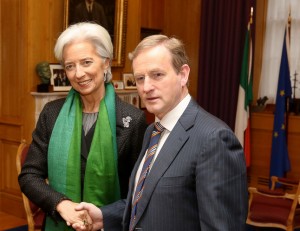Ireland, Angela Merkel’s sickly child, has decided to go off on its own. After taking an $87 billion European bailout to survive its severe economic malaise in 2010, the nation seems to have found some stable footing in its government finances. In light of this, when previous measures with the dreaded Troika – the IMF, European Central Bank and the European Commission – run out in the coming month, Ireland will not seek any new line of credit from the strict family of German-dominated lenders. There has been ample speculation about what this means for Europe’s other troubled economies. Could the other Euro-disasters, namely Spain, Portugal and Greece, soon regain some independence from Berlin’s strict grip? It’s highly unlikely, especially considering the dubious economic reality behind Ireland’s ‘recovery.’
The Irish decision to quit the EU bailout was partially a result of sound economics and partially a well-planned political maneuver. The nation has managed to regain investor confidence in its budget management skills, as it mostly met stringent austerity requirements for EU credit lines. Housing prices in the nation, which collapsed after a construction boom imploded in 2008, are showing modest increases for the first time since the crisis. Regardless, the nation’s banks are still mired in bad debt it incurred after naïve lending schemes in the early 2000s. The IMF warns that unemployment rates could see further deterioration after the bailout exit, depending on how banks and companies reacted to Ireland’s brave leap.

Why, then, would Ireland even want to untether its safety net? As is often the case in the EU, this rejection of assistance from Brussels served mostly to score political points. Prime Minister Enda Kenny will no longer have to face the ire of voters under what would surely be further budget chokeholds imposed by other austerity-obsessed Eurozone members. EU-imposed fiscal reform may have coaxed the Irish economy into stability, but at the price of public support for the government, which was said to have handed off Irish sovereignty to the Troika. Amidst a stream of difficult policy choices that were making his coalition increasingly unpopular, Kenny made the preliminary statement that Ireland would be rejecting Troika support at a conference for his party. Critics say the announcement was designed as a political ploy in order to test public opinion, and that he would likely have backtracked if reactions had gone sour. Kenny’s political gamble paid off, and the parties in his coalition received a healthy rise in approval ratings. Such indications of public trust are crucial for Kenny, who needs a cushion of support for the hotly contested parliamentary changes, health reforms and economic remaneuvering that he will champion in the coming months.
Regardless, the true extent of Ireland’s economic woes makes the political success of the bailout exit irrelevant. The Irish government is still severely indebted and must continue to manage the precarious situation of its crippled banks and housing market. To be fair, what Ireland has opted out of is not an absolutely necessary rescue fund. But over the coming months, the country will have to replace stringent German help with private debt management firms to keep its government finances floating. Ireland will probably be able to avoid the exorbitant bond rates of the past by taking advantage of its relative stability, allowing it to reduce the cost of borrowing. But even so, its current debt obligations will already take until 2042 to pay back. Despite stepping out of crisis mode, Ireland has little reason for celebration: the budget deficit is 7.5% of GDP and public debt is a whopping 124% of GDP, a figure misleading in itself because it is buoyed by the profits of multinationals which use the nation as a tax haven. A far more indicative figure is the country’s public debt compared to government income, which is predicted to be 3.5 times larger than what the government can afford in 2014, compared to 2.5 times in Spain and only 1.5 times in France. Although it may have evaded the political implications of requesting an “enhanced conditions” credit line from the European Central Bank, Ireland’s battle with its budget is long from over.
The gradually turning tide for Kenny’s coalition is an object of envy for the ruling coalition in Portugal, whose 2014 budget announcement met disruptive protests and general public disdain. Portugal’s budget made heavy-handed reductions to government pensions and raised the retirement age in accordance with the terms of its $104 million bailout announced in 2011 and ending next year. President Aníbal Cavaco Silva’s past measures for fiscal health have been largely rejected by the country’s constitutional court, meaning that his coalition will likely face the cold shoulder from both Portuguese voters and unimpressed credit rating agencies. This chaos is not a far cry from the situation in austerity-mired Ireland just a year before, but it is unclear whether its current government will survive the final leg of unpopular Troika policy.
The Irish bailout exit creates more questions than it solves; it was widely assumed that the nation would request additional, less stringent EU loaning measures, clearing a path for Europe’s other economies to do the same. Ireland’s move is possible thanks to its manageable 10-year bond yield rate of under 4%, meaning it is not too costly to borrow money from investors on the open market. In Portugal, this figure still lies at an unmanageable 6.5%, and in Greece more than 8.5%. For the moment, these nations are still at the mercy of Berlin, and the austerity-heavy budgets that Angela Merkel demands. Political instability (in the case of Portugal), and a catastrophic inability to decrease spending gaps (in the case of Greece) mean that these other nations have much less of a potential to follow the Irish jump out of EU dominance.
To say Ireland, or any cash-strapped European nation, could have altogether avoided an EU bailout is to ignore reality. Whereas stagnation has characterized the European economy in recent years, nothing short of economic ruin could have been expected had European powerhouses not stepped in to help their feeble neighbors. If anything, the tough love approach Merkel has championed was the only hope for reform in budget-bloated periphery economies, and even Ireland’s ability to quit the bailout scheme required strong EU, and especially German, support. With the exception of Greece, which is persistently unable to find its footing, the other troublemakers in the Eurozone are slowly dragging themselves into line. Ireland’s confidence in its situation should therefore be seen as a direct result of the EU bailout, not a rebuke of it. If countries like Portugal and Spain want to step out in the same way, they will likely have to delay stimulus efforts and push long-delayed austerity measures. Breaking with the Troika, as evident with the case of Ireland, makes for a convincing circus act, but the political acrobatics and fiscal contortions are little more than meager distractions from bigger issues.
